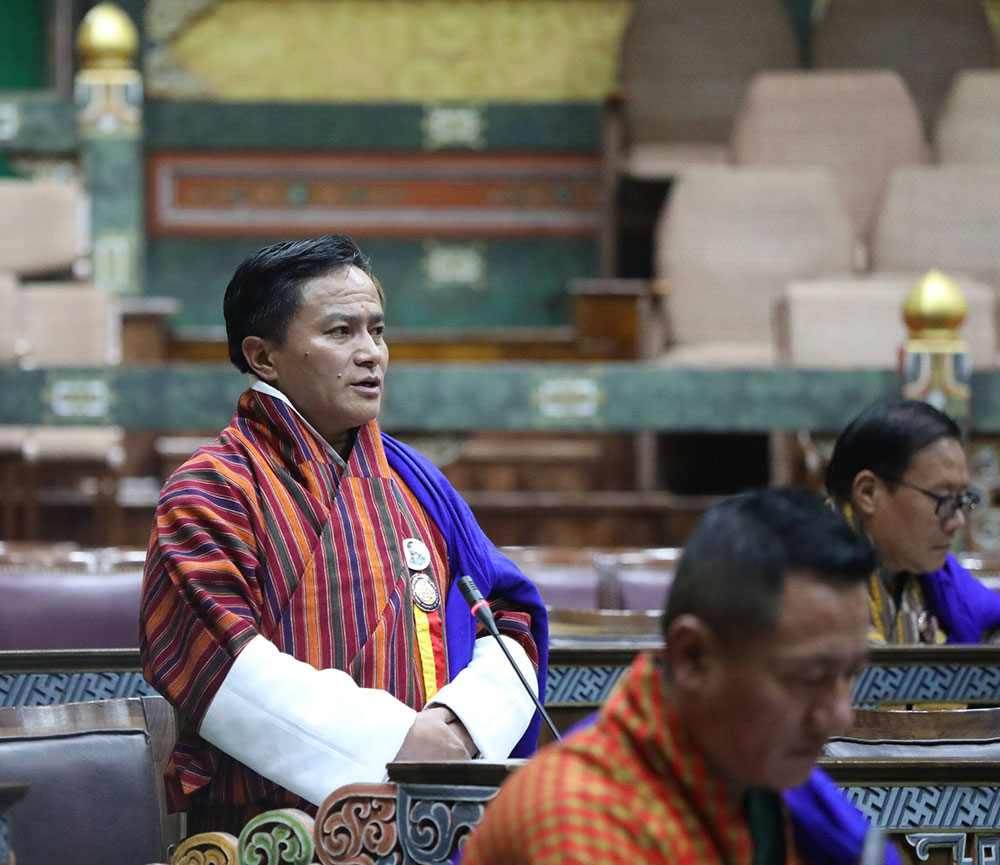NA endorses Priority Development Fund to the constituencies; FM to explore possibilities
Dechen Dolkar
Renamed as Priority Development Fund, the National Assembly on Monday endorsed a motion proposing to resume the Constituency Development Grant (CDG). However, there is a catch. The fund will have to be allocated from outside the dzongkhag and gewog funds with proper guidelines in place.
The member of the House Committee, a Member of Parliament (MP) from Lingmukha-Toewang constituency, Namgay Wangchuk proposed the motion on the need for a CDG to be designated as a Priority Development Fund.
CDG is a budget allocation mechanism that channels a certain portion of the national budget to the constituencies to finance ad hoc and immediate projects initiated by the people at the grassroots level for development.
In the past, under the CDG Nu 2 million per constituency per year was allocated. However, during the second government, the CDG was replaced by a gewog development grant allocated to the gewogs and during the third government it was renamed as a block grant.
During the first government term, the opposition members and National Council members opposed the CDG, calling it unconstitutional. They argued that it could breed both monetary and political corruption and could be used to win future elections. The Election Commission of Bhutan also wrote to the Prime Minister, asking the government to revoke the CDG.
MPs on Monday said that local governments have raised concerns about inadequate funds for development activities, particularly impacting remote communities. “It is felt that the resumption of CDG could supplement the resources and narrow the resource gap,” said MP Namgay Wangchuk.
He also said that due to budgetary limitations imposed on local governments, remote communities are often deprived of development facilities and are more vulnerable to natural disasters and calamities. “The response in terms of financial resources is slow. Additionally, the bond and linkages of remote communities with their MPs are relatively weaker, making them less aware of legislative and development priorities and trends. This weakens the credibility and relevance of MPs without the authority to provide support through a formal channel.”
The Royal Audit Authority findings show a utilization efficiency of 92.19 percent for the CDG.
He said that this fund would supplement resources, narrow the resource gap, and ensure equitable development within the gewog, ultimately contributing to the nation’s development.
Nyishog-Saephu constituency MP Kuenga said that all farm roads were constructed with the support of the gewog block grant in the past. When the central government allocates the budget, local leaders cannot spend on ad hoc and emergency activities, depriving them of economic opportunities.
MP Kuenga mentioned incidents where road blockages could not be addressed due to a lack of budget. “If there is a budget, the MPs can directly contact local leaders and resolve the issue,” he said.
MP Kuenga also pointed out that since many pledges are made before elections, people directly contact their MPs. However, when MPs request assistance from the government, they are told it has to go as per the plan and policies. “If there is an allocated budget, MPs can solve the issues immediately without having to wait for the next three to four years, and pledges will also be fulfilled,” he added.
Shomgpangkha constituency MP Dr Tek Bahadur Rai shared that in Sengye gewog, the electric fencing wire is not working, and the gewog lacks budget for maintenance. Similarly, in Chhudzom Gewog, roads destroyed by the monsoon cannot be repaired due to budget constraints. “We have pledged so much during elections, and without a budget, we cannot fulfil these pledges,” he said.
Many MPs raised concerns regarding the source of the fund with many pointing out it could not be from the gewog block grant.
Gangzur Minjey MP Loday Tsheten said that allocating the budget outside of the fiscal year budget allocation would benefit the people. However, he said that all activities in the plan and fiscal year budget allocation are resource-based budgeting activities. If CDG is considered a priority development fund, there may be a perception that activities included in the plan are not a priority.
Sharing his experience as a former finance ministry official, he said that although the block grants were successful, there were no significant achievements. “Some grants were not even utilized,” he said. “The Royal Audit Authority and the National Council in the past identified some lapses in previous records.”
Responding to the motion, Finance Minister Lekey Dorji said that they would consider allocating the budget from the next fiscal year based on available resources.
The House Committee recommended that the government allocate an adequate amount to the Fund in the next fiscal year with guidelines for allocation, utilisation, monitoring, and evaluation of activities, and reporting of implementation progress. The Committee also suggested that the government clearly define the areas where the Fund should be used to maximize benefits and present this to the NA’s plenary.
The House adopted the motion with a total of 33 Yes votes, 12 Abstentions, out of 45 members present and voting.


